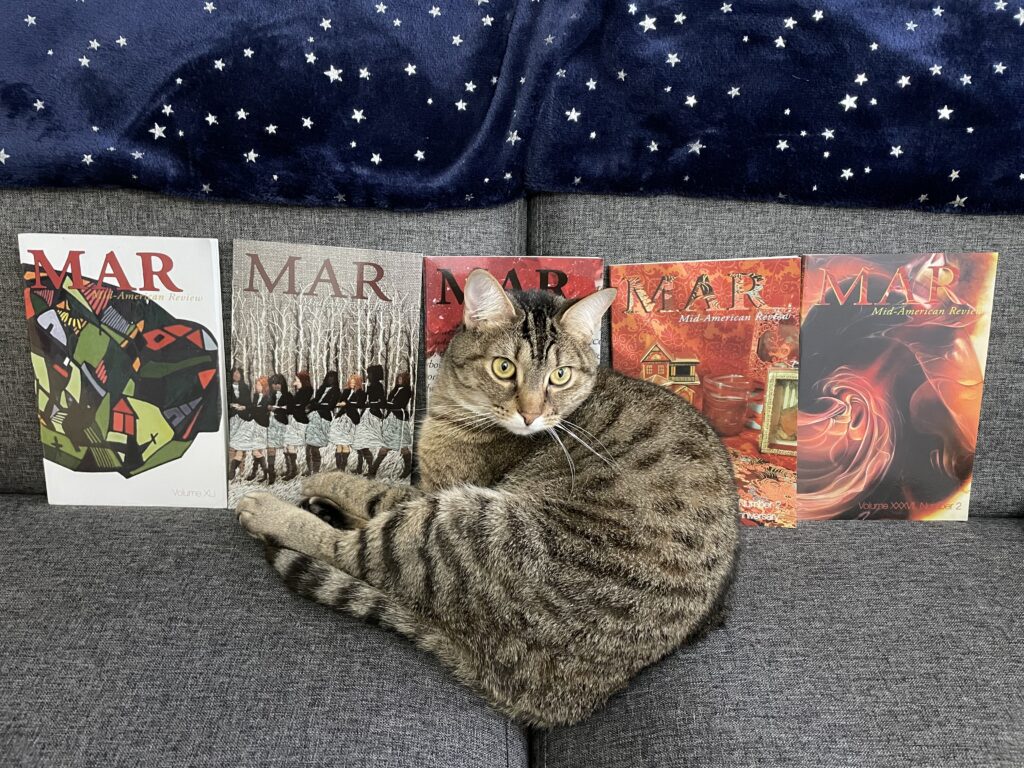I’m currently sitting with Kwame Dawes’ collection Nebraska (University of Nebraska Press, 2019). I just love Dawes’ poem “Chadron” from this collection and looking at the poem as an interrogation of the myth of the frontier and the speaker’s place as “a strange statue in the wind” (25) of Chadron, NE. I find this collection to be a search of place discussed through the seasons of Nebraska and through history. As a native Nebraskan, I find the poems in this collection honestly cohesive while also being a formally restless exploration of a place I have known for the thirty years of my life. While I keep returning to this collection, it returns me to a home I’ve known most of my life. The speakers of Dawes’ poems try to walk carefully over icy driveways due to the winter freeze in the opening poem “How I became an Apostle” (3); they realize how you learn to ignore the sounds of yourself in the quiet vastness Nebraska surrounds one with in “Loneliness” (14). In “Prairie” Dawes reminds us of the enormous space between the towns of Nebraska, assuring us it all “stretches over / the open fields, mutates, pulses, breathes, / finds its own music” (61).
I’ve also been revisiting Mary Oliver’s work. In particular, House of Light (Beacon Press, 1990). In my undergraduate career, I stumbled upon a reading of “The Summer Day” by Oliver herself and the grasshopper she describes “…eating sugar out of [her] hand” (60), which always takes me back to my childhood sitting in the grass outside of my grandparent’s house under the birch tree in their front lawn while grasshoppers would fling themselves into my palms. This poem found its way to me again as I drove back to Ohio from Nebraska nearing the end of winter break. I was listening to On Being with Krista Tippett, revisiting the interview with Mary Oliver, when Tippett played an audio file of her daughter reciting Mary Oliver’s “The Summer Day.” I found myself back in that innocence in the lawn as a young boy, much like I did in my undergrad, and when I returned home, I picked up Oliver’s book and found myself lost again in her poems, wanting “…to stroll through the fields” (60) rather than hiding from the cold of winter under a blanket in my Ohio apartment. I have this poem taped to my office door so I’m reminded of summer in these frigid months.
After moving to Ohio, I’ve kept a copy of Ted Kooser’s Splitting an Order (Copper Canyon Press, 2017) sitting on my office desk which I’ve returned to over and over throughout the fall semester and continue to do so. I find Kooser’s observations in Splitting an Order to be both incredibly familiar and quite deep in what lies behind the actions of the personae, as in the titular poem, which describes an elder couple, as the title suggests, splitting an order, “…and then to see him lift half / onto the extra plate that he asked the server to bring, / and then to wait, offering the plate to his wife” (9). It’s a very vulnerable act of compassion and love and I find myself returning to this poem when, at times, life may feel bleak and void of these acts, as a reminder that such small moments of kindness and love do exist. Poems such as “Two Men on an Errand” (5) take me back to my childhood spent in the waiting room of mechanic shops while my father talked the mechanic’s ear off as I spun on those stools wrapped in duct tape only found in mechanic and autobody shops, and the scent of grease and metal where men in denim bibs and suspenders would chat over coffee in Styrofoam cups. Maybe there’s an air of nostalgia with Kooser, but I’m wary of reducing Kooser to pure nostalgia as the sole reason I’ve read and keep reading this collection of poems. I think, too, of poems like “Garrison, Nebraska” and how Kooser speaks of his town in winter with “its gardens of broken washing machines, / its empty rabbit hutches nailed to sheds, / cold and alone on the sea of the prairie” (47) speaking on the beauty, the normality of cluttered lawns, and Nebraska’s harsh seasons. Or how he explores the domestic intimacy of a lost life in “Mouse in a Trap,” in which Kooser eulogizes what we deem as a pest and how it comes to rest on “…the ship / of the rest of its life” (48). I keep returning to this book for the way Kooser captures a life, or a moment of a life, and the impact these seemingly fleeting happenings that surround us can have, which only poetry can put words to.
—Tyler Michael Jacobs, MAR

